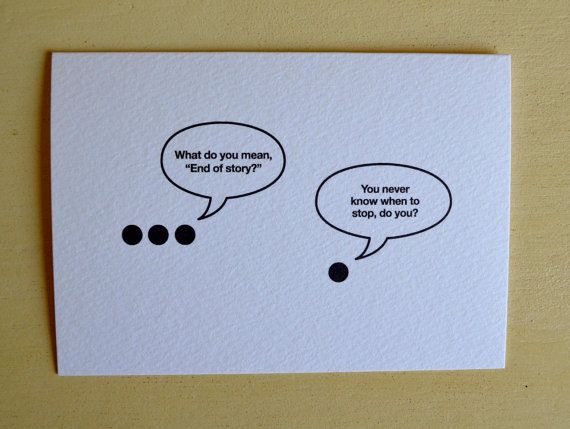|
Having trouble viewing this message? Click here to view it online.
To unsubscribe or change contact details, scroll to the bottom and follow the link.
|



|
|
Definition: An ellipsis (plural: ellipses) is a punctuation mark consisting of three dots.
Use an ellipsis when omitting a word, phrase, line, paragraph, or more from a quoted passage. Ellipses save space or remove material that is less relevant. They are useful in getting right to the point without delay or distraction:
Although ellipses are used in many ways, the three-dot method is the simplest. Newspapers, magazines, and books of fiction and nonfiction use various approaches that they find suitable.
Our preference is to enclose the ellipsis with a space on each side. Choose a method and be consistent.
Full quotation: "Today, after hours of careful thought, we vetoed the bill."
With ellipsis: "Today … we vetoed the bill."
Some writers and editors feel that no spaces are necessary.
Example: "Today…we vetoed the bill."
Still others put a space either directly before or directly after the ellipsis.
Examples:
"Today …we vetoed the bill."
"Today… we vetoed the bill."
A four-dot method and an even more rigorous method used in legal works require fuller explanations that can be found in other reference books.
Rule 1. Many writers use an ellipsis whether the omission occurs at the beginning of a sentence, in the middle of a sentence, or between sentences.
A common way to delete the beginning of a sentence is to follow the opening quotation mark with an ellipsis, plus a bracketed capital letter:
Example: "… [A]fter hours of careful thought, we vetoed the bill."
Other writers omit the ellipsis in such cases, feeling the bracketed capital letter gets the point across.
For more on brackets, see Parentheses and Brackets.
Rule 2. Ellipses can express hesitation, changes of mood, suspense, or thoughts trailing off. Writers also use ellipses to indicate a pause or wavering in an otherwise straightforward sentence.
Examples:
I don't know … I'm not sure.
Pride is one thing, but what happens if she …?
He said, "I … really don't … understand this."
|
View and comment on this
article on our website.
|
|
Free BONUS Quiz for You!
Friend, because you are a subscriber to the newsletter, you get access to one of the Subscribers-Only Quizzes. Click here to take a Question Marks and Quotation Marks Quiz and get your scores and explanations instantly!
We will be adding many more quizzes this year to our already substantial list of quizzes. If you have suggestions for topics we have not yet covered, please send us a message at help@grammarbook.com.
|
Hundreds of Additional Quizzes
at Your Fingertips
Subscribe now to receive hundreds of additional English usage quizzes not found anywhere else!
Teachers and Employers
Save hours of valuable time! You may assign quizzes to your students and employees and have their scores tallied, organized, and reported to you! Let GrammarBook.com take the hassle out of teaching English!
"Fun to test my skills."
"The explanations really help ... thanks!"
"I can select the quizzes to assign to my students, and then the results are reported to me automatically!"
|

|
Don't need all the quizzes?
You can now purchase the same quizzes individually for ONLY 99¢ each.
Purchase yours here. |
If you think you have found an error in a quiz, please email us at help@grammarbook.com
|
 |
The Blue Book of Grammar and Punctuation
by Jane Straus, Lester Kaufman, and Tom Stern |
The Authority on English Grammar! Eleventh Edition Now Available
An indispensable tool for busy professionals, teachers, students, homeschool families, editors, writers, and proofreaders.
Available in print AND as an e-Book! Over 2,000 copies are purchased every month!
The publisher of The Blue Book, Jossey-Bass, A Wiley brand, is offering a 35 percent discount for those of you who order the book through Wiley.com. Shipping and tax are not included. Simply go to bit.ly/1996hkA and use discount code E9X4A.
Offer expires December 31, 2020.
|
Wordplay

|
 |
English In A Snap:
68 One-Minute English Usage Videos FREE |
Learn all about who and whom, affect and effect, subjects and verbs, adjectives and adverbs, commas, semicolons, quotation marks, and much more by just sitting back and enjoying these easy-to-follow lessons. Tell your colleagues (and boss), children, teachers, and friends. Click here to watch.
|
|